Volume 26 · Number 4 · Summer 2009
Vanderhoef: Looking Back
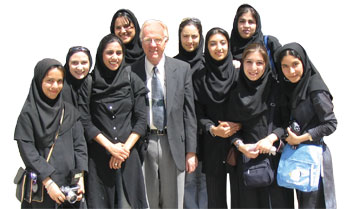
Building Bridges Internationally
“Do you believe we’re all terrorists?” a young Iranian girl asked Vanderhoef during his 2004 visit to Iran. It was a question “I will never forget, to the day I die.” Believing that cross-cultural interaction is our best hope for world peace, the chancellor has long advocated global links between universities and promoted student and scholar exchange. Students who immerse themselves in a different culture often tell him the experience changed their lives: “It’s an experience I’d like every one of our students to have.”
Brownbag Chats
In the tough budget times of the early 1990s, Vanderhoef began holding noon-hour brownbag chats on campus. He continued to hold the sessions to give updates and answer questions throughout his tenure. At one memorable gathering in fall 1998, he received a banana cream pie in the face, with responsibility claimed by the Biotic Baking Brigade in protest of a possible campus alliance with Monsanto. The following meeting, Vanderhoef offered banana cream pie slices to everyone in attendance, announcing “I’m baaaaack!”
On a Wing and a Prayer
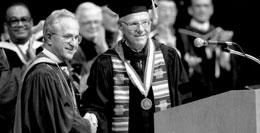
Believing the campus couldn’t wait any longer, Vanderhoef announced at his inauguration his intention to pursue a center for the performing arts — despite UC President Jack Peltason’s sage advice to never promise anything unless you’re absolutely certain it can be accomplished. “I did it anyway,” Vanderhoef said, “believing — hoping — that sheer determination would trump adversity. ‘You’re a slow learner,’ Peltason told me after the speech.”
Making College Real
The first in his family to complete high school, Chancellor Vanderhoef knows the importance of role models and guideposts. Unveiling a long-term partnership program designed to prepare economically and educationally disadvantaged students for college, Vanderhoef handed out his business cards to partner-school fourth-graders in 1999, saying, “Tell your parents that, if they have any questions along the way, you have a friend at UC Davis they can call.” Those fourth-graders are now college age, with 16 enrolling at UC Davis.
Sweet Kindness
As former Aggie Editor Eleeza Agopian ’01 tells it, she’d written a sappy column just before Valentine’s Day, hinting at a recent breakup. Dateless on heart day, she was working the Aggie’s night desk and briefly ducked out for a bathroom break. When she returned, she found a heart-shaped box of chocolates on her desk. Her Aggie compatriots insisted the chancellor had just brought the box by for her. “I didn’t for a second believe that the chancellor had come to Lower Freeborn at 8 on a school night to drop off some chocolates for me,” Agopian said. And yet…what if he had? (And he had.) “I finally sent the chancellor a note that looked like this: ‘Dear Chancellor, I just wanted to thank you for the lovely box of chocolates. It was a very sweet gesture and I really appreciate it. If, however, for some reason this makes no sense to you, I just want you to know that my friends have just played a really cruel trick on me and I wanted to cover my bases so you wouldn’t think me rude.’ He promptly replied: ‘I don’t know why you would think that, but I hope you enjoy the chocolates.’”
Researchers’ Deaths in the Sea of Cortez
When he learned a March 27, 2000, boating accident in Mexico’s Sea of Cortez had claimed the lives of two UC Davis scientists and three visiting scholars from Japan, Chancellor Vanderhoef flew to the San Diego border with campus counselors to meet surviving members of the research expedition and chartered a plane to bring them home. He also met at the San Diego airport with the grieving families of the Japanese professors who had perished. “This week of tragedy, of sorrow, of heroism” will be “remembered forever at UC Davis,” he wrote to campus community members. Memorial trees — two white chitalpas, native to the Baja region of California, and three Japanese magnolias — were planted in the arboretum in the scientists’ honor.
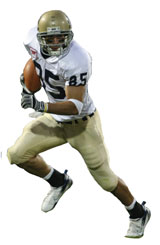
Move to Division I Athletics
In 2003, Vanderhoef announced that UC Davis would move from Division II to Division I athletics, knowing that the faculty as a whole would not be supportive. He said then that the campus really had no alternative. “We are seeking, in an evolving landscape, firm ground upon which to continue and to enhance a program that is centered around the student-athlete and the teacher-coach,” he said at the time. The Big West Conference would offer Davis a better academic, philosophical and competitive “fit,” he said, and align it with sister campuses UC Irvine, UC Riverside and UC Santa Barbara. The chancellor’s decision “took UC Davis athletics to the highest level and made certain it was done in a way that would make us all proud,” says alumnus and Davis Enterprise columnist Bob Dunning. “It wasn’t an easy decision and it had substantial and sincere opposition, but looking back, it was clearly the right decision.”
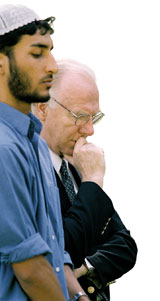
September 11, 2001
Just days after the Sept. 11 attacks, Chancellor Vanderhoef gathered with Sultan Yusufzai, president of the campus’s Muslim Student Association, and some 350 other students and campus employees in a moment of silence during the National Day of Remembrance.
UC Davis did not close on Sept. 11, as some universities did. “Had we closed, it would have been one more thing that the terrorists could have added to the list of how they disabled this country,” Vanderhoef said at the time. “It is paramount that we not give in, that the campus remain open to provide assistance and support to each other.”
Confidence Reaffirmed
Controversy over a high-level separation agreement, inflamed by executive compensation scandals in the UC Office of the President, led 56 Davis faculty members to call for a vote of no confidence in the chancellor in 2006. Faculty voted 70 percent to 30 percent to reject the no-confidence resolution. Law professor and then-Academic Senate Chair Dan Simmons, in a ballot argument opposing the resolution, wrote: “My several conversations with Chancellor Vanderhoef…convince me that he acted forthrightly in what he believed was the best interest of the campus and the university.”
Nurturing University Leaders
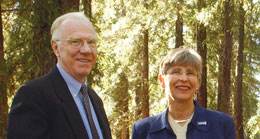
Vanderhoef is widely credited with nurturing future university presidents and provosts, with more than a dozen UC Davis administrators going on to such top posts during his tenure. They credit his collegial and collaborative approach to problem solving, along with his belief in delegating both authority and responsibility, with providing them the opportunity to move on and up. “That type of experience, particularly with an excellent, diverse team, provides strong leadership development,” said Virginia Hinshaw, former UC Davis provost/executive vice chancellor and current University of Hawaii-Manoa president. Added Mark McNamee, former UC Davis dean of biological sciences and now provost of Virginia Tech, “Larry Vanderhoef sets a positive tone at the top for good behavior among administrators, and I believe this brings out the best in people.”
